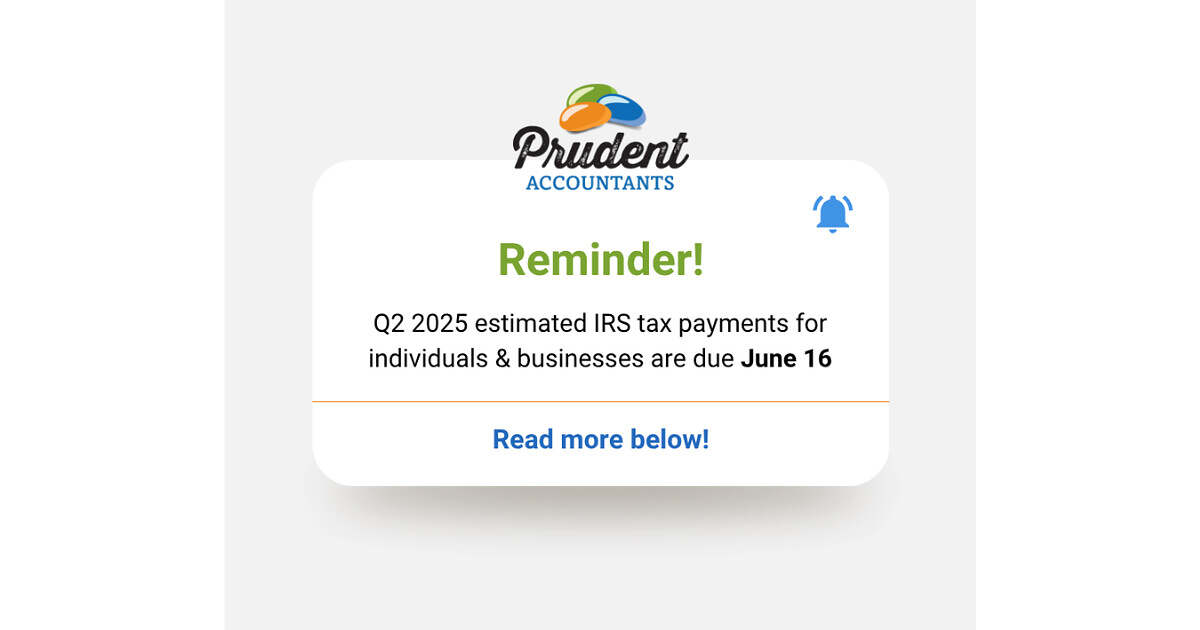Two Critical IRS Tax Payments You Might Be Overlooking—And What To Do About Them

For many small business owners and self-employed professionals, tax season may feel like it ends in April. But in reality, the IRS operates on a “pay-as-you-go” system—and if you’re not keeping up with estimated payments, you could be heading for costly penalties and cash flow issues.
One of the most commonly misunderstood tax responsibilities is estimated quarterly tax payments. And two of the most important groups affected are individuals who earn income outside of W-2 employment and business owners operating through corporations or partnerships.
Here’s what you need to know about the upcoming requirements and how to stay compliant.
1. Estimated Tax Payments for Individuals (Form 1040-ES)
If you’re a sole proprietor, freelancer, landlord, gig worker, or otherwise earn income that isn’t subject to tax withholding, the IRS expects you to make estimated payments throughout the year.
Key Requirement:
For Q2 of 2025, the second estimated tax installment is due June 16, 2025.
Who this applies to:
- Self-employed individuals
- Landlords earning rental income
- Independent contractors and consultants
- Side hustlers and gig economy workers
- Retirees with investment income not covered by withholding
Why it matters:
Failing to pay enough throughout the year—even if you pay in full by April of the following year—can result in underpayment penalties and interest. The IRS expects payments to be made quarterly unless your withholding covers 90–100% of your tax liability.
How to pay:
Use IRS Form 1040-ES or make payments directly through the IRS online portal. Work with a tax advisor to calculate your estimated income and deductions accurately.
2. Q2 Tax Obligations for Corporations and Partnerships
June 16 is also a major due date for business entities—especially those taxed as C-Corporations, S-Corporations, or Partnerships that have elected Pass-Through Entity (PTE) Taxation.
C-Corporations
C-Corps must pay estimated income tax payments every quarter. For Q2, that payment is due June 16, 2025.
S-Corporations & Partnerships (PTE Election)
If your S-Corp or Partnership has elected to be taxed under the Pass-Through Entity (PTE) Tax regime in states like Minnesota, you’re also responsible for a quarterly estimated PTE tax payment on that date.
Why it matters:
Many business owners mistakenly assume that estimated payments are just for individual taxpayers. But the IRS—and most states—require entities themselves to remit taxes on income even before filing the final return. Missing these payments can result in steep penalties, interest, and red flags during audits.
What to do:
- Review your entity’s year-to-date income and projections.
- Revisit your PTE election to ensure you’re calculating payments accurately.
- Talk to your accountant about optimizing the tax timing between business distributions and estimated tax obligations.
Why This Catches Business Owners Off Guard
Many entrepreneurs—especially first-generation or newer business owners—don’t realize that estimated taxes are not optional. The most common issues we see:
- Waiting until year-end to “catch up” on taxes
- Not adjusting quarterly payments as income grows
- Thinking that a tax refund means no estimated payments are needed
- Assuming S-Corps don’t need to pay anything quarterly
At Prudent Accountants, we work with entrepreneurs every day who want to avoid surprises, stay compliant, and feel confident in how they manage tax obligations. We understand the language, the pressure, and the emotional toll of financial uncertainty—and we’re here to guide you, not judge you.
Final Thought: Small Adjustments = Big Savings
Quarterly estimated payments don’t have to be stressful. With proactive planning, a good financial partner, and clear communication, you can meet your obligations without the end-of-year panic or penalties.
If you’re not sure whether these rules apply to you—or how to calculate what you owe—reach out to us today. We’ll help you get clarity on your tax strategy so you can move forward with confidence.
Need help calculating your estimated taxes or staying on track with business compliance?
Let’s connect—because peace of mind shouldn’t be seasonal.
